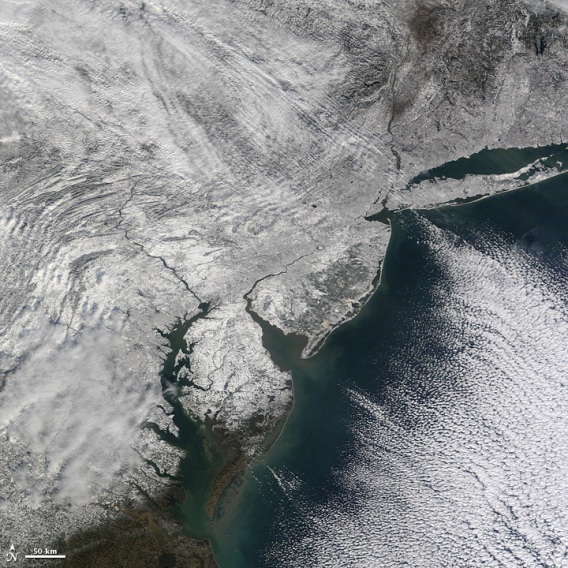Over the past few weeks the United States has been pounded by a number of big snow storms. A week ago Washington DC received 18 inches of snow, setting a number of records. Over Christmas, the middle of the country, from Texas to Minnesota was also hit by record amounts of snow. While snow fall over the East Coast and middle of the country in the United States in December is hardly unusual, a number of record amounts of precipitation may point to a larger shift in the climate. Scientists say that higher temperatures causes more water evaporation, which increases the chances of heavy precipitation events, such as floods and snowstorms.
Oklahoma City hit a record with 14 inches of snow. Dallas-area received its first snowfall on Christmas Eve since records began in 1898. The snowfall also broke Christmas Eve records for Minnesota’s Twin Cities by over two inches. Twenty-three people were killed so far due to the extreme weather across the middle of the country.
While scientists say that it is not possible to link a single extreme weather-event—such as one record snowfall—directly to climate change, a pattern of increased heavy precipitation is expected due to climate change in the US. According to the NCDC’s Climate Extreme Index (CEI) heavy daily precipitation has been increasing since 1950 in the United States.
Globally, precipitation has increased in regions over 30 degrees north according to the Intergovernmental Panel on Climate Change, but has been declining in tropical regions since the 70s.

Snow storm hits East Coast: the image from the Moderate Resolution Imaging Spectroradiometer (MODIS) on NASA’s Terra satellite shows the Chesapeake Bay area on December 21. Photo by: Jesse Allen of NASA EArth Observatory.
Related articles
Current decade is the warmest on record
(12/08/2009) As 192 countries meet in Copenhagen to wrangle out a complex and at times sticky agreement to combat climate change, the World Meteorological Organization (WMO) has released new evidence that the world is undergoing warming. According to the WMO the current decade is likely the warmest on record.
Global warming will increase likelihood of civil war in Africa by 55 percent
(11/23/2009) There have been many warnings by policymakers that rising temperatures in Africa could lead to civil conflict, however a new study in Proceedings of the National Academy of Sciences is the first to uncover empirical evidence for these warnings and quantify them. The results—that higher temperatures increased the likelihood of civil war in sub-Saharan Africa by over 50 percent—took aback even the researchers.
NASA satellite image reveals extent of drought in East Africa
(11/05/2009) A new image from NASA shows the severity of the drought in East Africa, which impacted Tanzania, Kenya, Ethiopia, and Somalia.
Global warming-induced forest fires to increase health risks in western U.S.
(07/28/2009) Warmer, drier climate in the American West will increase the incidence and severity of forest fires, worsening air quality, reports a new study accepted for publication in the Journal of Geophysical Research – Atmospheres.
New report predicts dire consequences for every U.S. region from global warming

(06/17/2009) Government officials and scientists released a 196 page report detailing the impact of global warming on the U.S. yesterday. The study, commissioned in 2007 during the Bush Administration, found that every region of the U.S. faces large-scale consequences due to climate change, including higher temperatures, increased droughts, heavier rainfall, more severe weather, water shortages, rising sea levels, ecosystem stresses, loss of biodiversity, and economic impacts.
River systems worldwide are losing water due to global warming
(04/22/2009) Many rivers around the world are losing water due to global climate change, according to a new study from the American Meteorological Society’s Journal of Climate. Large populations depend on some of the rivers for everything from agriculture to clean drinking resources, including the Yellow River, the Ganges, the Niger, and the Colorado, which have all shown significant declines.
Global warming will hit corn yields, costing US over a billion dollars annually
(04/10/2009) Corn is the staple crop of the US. Its annual yield is more than twice that of any other American crop, covering an astounding 125,000 square miles. However, this behemoth crop is currently threatened. A new analysis by Environment America, shows that lower yields of corn due to global warming will cost farmers 1.4 billion every year.
Global warming to strengthen Arctic storms
(02/05/2009) Arctic storms could worsen due to climate change, putting fisheries, oil and gas exploration, and sea lanes at risk, warn researchers writing in the journal Climate Dynamics.
Climate change will cost California billions
(11/14/2008) $2.5 trillion of real estate assets in California are at risk from extreme weather events, sea level rise and wildfires expected to result from climate change over the course of a century, according to a new assessment from UC Berkeley researchers.